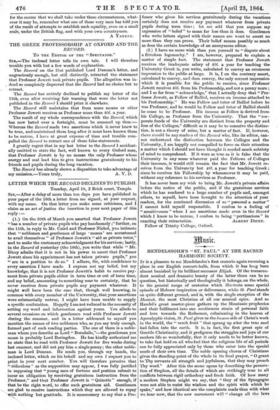LETTER WHICH THE RECORD DECLINES TO PUBLISH.
Tuesday, April 19, 2 Brick court, Temple. SIR,—After a delay of more than ten days you have published in your paper of the 18th a letter from me signed, at your request, with my name. On that letter you make some criticisms, and I claim as an act of justice the insertion in your next paper of this reply : -
(1.) On the 30th of March you asserted that Professor Jowett " has a number of private pupils who pay handsomely ;" further, on the 11th, in reply to Mr. Caird and Professor Nichol, you intimate that " noblemen and gentlemen of large means' are accustomed to avail themselves " of Professor Jowett's " aid as private tutor," and to make the customary acknowledgment for his services; lastly, in the Record of yesterday (the 18th), you write that while " Mr. Dicey admits that it is not in his power to assert that Professor Jowett since his appointment has not taken private pupils," you " are in a position to do so." I adhere, Sir, with confidence to every assertion I have made. I express not my belief, but my knowledge, that it is not Professor Jowett's habit to receive pay- ment from private pupils either in term time or out of term time, and my belief, amounting to something near to certainty, that he never receives from private pupils any payment whatever. It might well have been the case that, though well knowing, in common with every member of the University, that your assertions were substantially untrue, I might have been unable to supply a specific confutation. Happily I am not reduced to the necessity of setting my word and information against yours. You allude to several occasions on which gentlemen read with Professor Jowett during the summer, and in a letter addressed to myself you mention the names of two noblemen who, as you say truly enough, formed part of such reading parties. The one of them is a noble- man whom you describe as Lord " Borodaile,"—the gentleman you mean is probably Lord Boringdon. He has kindly authorized me to state that he read with Professor Jowett for five weeks during last summer, and did not pay him a single penny; the other noble- man is Lord Duncan. He sends you, through my hands, the inclosed letter, which on his behalf and my own I request you to print in your next number. You will therefore perceive that "ridiculous " as the supposition may appear, I was fully justified in supposing that "young men of fortune and position submit to incur an obligation by receiving gratuitous instruction from the Professor," and that Professor Jowett is " Quixotic " enough, if that be the right word, to offer such gratuitous aid. Gentlemen are glad to receive instructions which they are allowed to repay with nothing but gratitude. It is unnecessary to say that a Pro-
fessor who gives his services gratuitously during the vacations certainly does not receive any payment whatever from private pupils during term time ; let me add that you suppose my expression of " belief " to mean far less than it does. Gentlemen who write letters signed with their names are wont to assert no more than they can prove. Their belief means possibly as much as does the certain knowledge of an anonymous editor.
(2.) I have no more wish than you yourself to " dispute about a frivolous logomachy." I am, however, prepared to explain a matter of simple fact. The statement that Professor Jowett receives the inadequate salary of 401. a year for teaching the University Greek is, you write, calculated to convey an erroneous impression to the public at large. It is, I on the contrary assert, calculated to convey, and does convey, the only correct impression which it is possible for the public to receive, since Professor Jowett receives 401. from his Professorship, and not a penny more ; and I so far from " acknowledge," that I actually deny that " Pro- fessor Jowett, as Fellow of Banjo], receives an income attached to his Professorship." He was Fellow and tutor of Balliol before he was Professor, and he would be Fellow and tutor of Balliol should he cease to be Professor. His income as Fellow is derived from his College, as Professor from the University. That the " cor- porate funds of the University are distinct from the property and fees of the Colleges," difficult as it may be to conceive the distinc- tion, is not a theory of mine, but a matter of fact. If, however, there should be any readers of the Record who, like its editor, can- not understand the distinction between the Colleges and the University, I am happily not compelled to force on their attention a matter which I should not have thought it needed much subtlety of mind to comprehend. If it were as true as it is false that the University in any sense whatever paid the Fellows of Colleges their incomes, it would still remain the fact that Mr. Jowett re- ceives from the University but 401. a year for teaching Greek ; since he receives his Fellowship by whomsoever it may be paid, without any reference to his services as Professor.
It has never been my wish to bring Mr. Jowett's private affairs before the notice of the public, and if the gratuitous services which he has rendered to a large number of pupils and, amongst others, to myself, have been brought to the attention of your readers, for the continued discussion of so " personal a matter " I cannot hold myself responsible. I confess to a feeling of " sensitiveness " when I see assertions made even in the Record which I know to be untrue, I confess to being " pertinacious " in exacting their retractation. ALBERT DICEY. Fellow of Trinity College, Oxford.






























 Previous page
Previous page